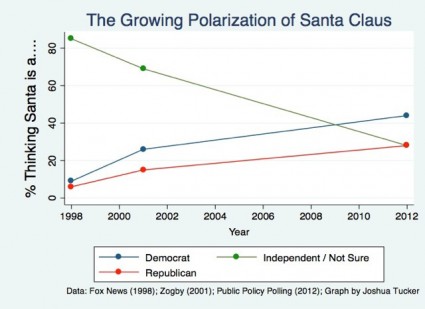 At some point, Sen. Lisa Murkowski is going to have to face the Valley tea party masses, which isn’t often pretty. Those people are not above yelling and hissing and booing, which might be okay if they also didn’t have a set of facts on hand to justify it all. They know all about cloture, and filibusters, and why Obama purposely infected the nation with Ebola. They know not only what the debt ceiling is, but how much it is, and they know that it’s all leading to some sort of UN takeover that involves a one-world currency and FEMA camps. They also know that they, along with other Valley Republicans—and unfortunately you can’t pick and choose– are the ones who will likely have a big hand in deciding who wins a Republican primary. Anyway, apparently Murkowski has had better things to do, for months and months now. This weekend, the first weekend after Congress adjourned for the break, she opted for the relatively urban, friendly confines of Anchorage, where on Friday, you could find her at the annual Republican Women’s holiday lunch at the Captain Cook Hotel. The annual luncheon was started by Sen. Ted Stevens in 1978 and Murkowski has continued the tradition and added her own touch: each table was decorated with holiday cookies from a traditional Murkowski family recipe. Guests also found ornaments, created by an Alaskan artist, on their plates and each was signed by Alaska’s senior senator. The room was packed. Also spotted: U. S. Sen.-elect Dan Sullivan and his wife Julie, Reps. Dan Sadler and Gabrielle LeDoux, Rep.-elect Cathy Tilton, Marilyn Stewart, Art and April Hackney, mayoral candidate Dan Coffey, Wanda Green, Angelina Burney, Robin Phillips, and Kara Moriarty. Kay Linton’s daughter, Dawn, hosted a table at the event with an empty chair to honor her mother, who before her passing was always a fixture at the annual event. Continue reading →
At some point, Sen. Lisa Murkowski is going to have to face the Valley tea party masses, which isn’t often pretty. Those people are not above yelling and hissing and booing, which might be okay if they also didn’t have a set of facts on hand to justify it all. They know all about cloture, and filibusters, and why Obama purposely infected the nation with Ebola. They know not only what the debt ceiling is, but how much it is, and they know that it’s all leading to some sort of UN takeover that involves a one-world currency and FEMA camps. They also know that they, along with other Valley Republicans—and unfortunately you can’t pick and choose– are the ones who will likely have a big hand in deciding who wins a Republican primary. Anyway, apparently Murkowski has had better things to do, for months and months now. This weekend, the first weekend after Congress adjourned for the break, she opted for the relatively urban, friendly confines of Anchorage, where on Friday, you could find her at the annual Republican Women’s holiday lunch at the Captain Cook Hotel. The annual luncheon was started by Sen. Ted Stevens in 1978 and Murkowski has continued the tradition and added her own touch: each table was decorated with holiday cookies from a traditional Murkowski family recipe. Guests also found ornaments, created by an Alaskan artist, on their plates and each was signed by Alaska’s senior senator. The room was packed. Also spotted: U. S. Sen.-elect Dan Sullivan and his wife Julie, Reps. Dan Sadler and Gabrielle LeDoux, Rep.-elect Cathy Tilton, Marilyn Stewart, Art and April Hackney, mayoral candidate Dan Coffey, Wanda Green, Angelina Burney, Robin Phillips, and Kara Moriarty. Kay Linton’s daughter, Dawn, hosted a table at the event with an empty chair to honor her mother, who before her passing was always a fixture at the annual event. Continue reading →



 eera
eera At some point, Sen. Lisa Murkowski is going to have to face the Valley tea party masses, which isn’t often pretty. Those people are not above yelling and hissing and booing, which might be okay if they also didn’t have a set of facts on hand to justify it all. They know all about cloture, and filibusters, and why Obama purposely infected the nation with Ebola. They know not only what the debt ceiling is, but how much it is, and they know that it’s all leading to some sort of UN takeover that involves a one-world currency and FEMA camps. They also know that they, along with other Valley Republicans—and unfortunately you can’t pick and choose– are the ones who will likely have a big hand in deciding who wins a Republican primary. Anyway, apparently Murkowski has had better things to do, for months and months now. This weekend, the first weekend after Congress adjourned for the break, she opted for the relatively urban, friendly confines of Anchorage, where on Friday, you could find her at the annual Republican Women’s holiday lunch at the Captain Cook Hotel. The annual luncheon was started by Sen. Ted Stevens in 1978 and Murkowski has continued the tradition and added her own touch: each table was decorated with holiday cookies from a traditional Murkowski family recipe. Guests also found ornaments, created by an Alaskan artist, on their plates and each was signed by Alaska’s senior senator. The room was packed. Also spotted: U. S. Sen.-elect Dan Sullivan and his wife Julie, Reps. Dan Sadler and Gabrielle LeDoux, Rep.-elect Cathy Tilton, Marilyn Stewart, Art and April Hackney, mayoral candidate Dan Coffey, Wanda Green, Angelina Burney, Robin Phillips, and Kara Moriarty. Kay Linton’s daughter, Dawn, hosted a table at the event with an empty chair to honor her mother, who before her passing was always a fixture at the annual event.
At some point, Sen. Lisa Murkowski is going to have to face the Valley tea party masses, which isn’t often pretty. Those people are not above yelling and hissing and booing, which might be okay if they also didn’t have a set of facts on hand to justify it all. They know all about cloture, and filibusters, and why Obama purposely infected the nation with Ebola. They know not only what the debt ceiling is, but how much it is, and they know that it’s all leading to some sort of UN takeover that involves a one-world currency and FEMA camps. They also know that they, along with other Valley Republicans—and unfortunately you can’t pick and choose– are the ones who will likely have a big hand in deciding who wins a Republican primary. Anyway, apparently Murkowski has had better things to do, for months and months now. This weekend, the first weekend after Congress adjourned for the break, she opted for the relatively urban, friendly confines of Anchorage, where on Friday, you could find her at the annual Republican Women’s holiday lunch at the Captain Cook Hotel. The annual luncheon was started by Sen. Ted Stevens in 1978 and Murkowski has continued the tradition and added her own touch: each table was decorated with holiday cookies from a traditional Murkowski family recipe. Guests also found ornaments, created by an Alaskan artist, on their plates and each was signed by Alaska’s senior senator. The room was packed. Also spotted: U. S. Sen.-elect Dan Sullivan and his wife Julie, Reps. Dan Sadler and Gabrielle LeDoux, Rep.-elect Cathy Tilton, Marilyn Stewart, Art and April Hackney, mayoral candidate Dan Coffey, Wanda Green, Angelina Burney, Robin Phillips, and Kara Moriarty. Kay Linton’s daughter, Dawn, hosted a table at the event with an empty chair to honor her mother, who before her passing was always a fixture at the annual event.